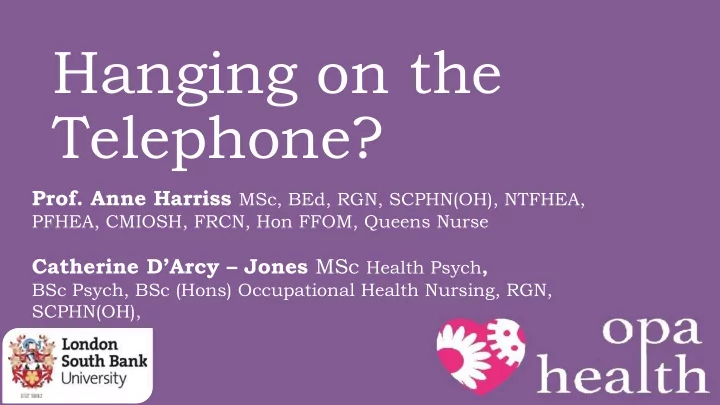

Hanging on the Telephone? Prof. Anne Harriss MSc, BEd, RGN, SCPHN(OH), NTFHEA, PFHEA, CMIOSH, FRCN, Hon FFOM, Queens Nurse Catherine D’Arcy – Jones MSc Health Psych , BSc Psych, BSc (Hons) Occupational Health Nursing, RGN, SCPHN(OH),
Background • From Alexander Bell to Social Media • Telephone remains a controversial medium (T Males 2007) • Subject to the same fundamental clinical assessment principles (Ferguson 2008) • Varying functions • Skills and Training remain central to telephonic assessments
Success with Telephone Assessments Occupational GP Services Physiotherapy Emergency 111 Health call centres Services
Using your senses… Or are your other senses Does removing heightened? your sight impair your ability to make a sound clinical judgement?
Patient perception Use of evidence based vs. reality of tools (PHQ9 / GAD7) function Assessment Skills Evidence based Functional recovery guidelines assessment (in relation to everyday activities Open/Closed questioning
Commercial/Company Expectations Advantages Disadvantages Communication difficulties More cost effective Cannot carry out a visual Builds OH practitioner’s assessment / physical communication and questioning examination of client skills Consistent standard of assessment Faster turnaround of delivering reports Higher ‘attendance’ rate
Practitioner Reactions Advantages Disadvantages Greater convenience / Lonely / Isolating flexibility Concerns over how to extract Ease of administration side enough information to make a of the role decision
Successful Telephone Assessments
The Educational Preparation of OHN’s
Standards & Guidance for Course Content Public Health England (2016) NMC (2004) GOOD PRACTICE to comply with educating MUST comply with Occupational Health Standards of proficiency for Nurses Specialist Community Public Health Nurses
Standards Standards of proficiency for Specialist Community Public Health Nursing (NMC, 2004) • Preparation: fitness for practice • Service: fitness for purpose • Recognition: fitness for award • Responsibility: fitness for professional standing The NMC standards for course inclusion are broad, resulting in significant differences in course content across HEIs
Public Health England Document Case management is included Guidance only within this document – not specific as to how this is Stamp of approval by undertaken. Telephonic RCN, AOHNP, FOHN consultation not explicit. Developed by very experienced OH nurses including educators
Preparing Students LSBU Case management module – includes: Contemporary Issues – includes • Attendance management professional and ethical • Taking an (OH) health history considerations relating to OH • The principles of both telephonic interventions and face-to-face health assessment Practice component – currently 119 days in practice – students are Developed teaching and learning encouraged to observe telephonic activities on telephonic assessment assessments within this element
Programmes Preparing OHN’s MUST incorporate: NMC Standards for Specialist Community Public Health Nursing https://www.nmc.org.uk/globalassets/sitedocuments/standards/nmc-standards-of-proficiency-for- specialist-community-public-health-nurses.pdf SHOULD incorporate: Public Health England document Educating Occupational Health Nurses: https://vivbennett.blog.gov.uk/wp-content/uploads/sites/90/2016/11/Educating-OHNs-final-Oct- 2016-FinalNB071116-1.pdf Approaches to health assessment are implied but not specified. Telephonic assessments are an increasingly common development in practice.
Awareness of the research Many nurses move into OH from NHS Direct findings - “distractibility” - need to mitigate against this Developing Overlap of skills: for face to the face/telephonic consultations Algorithms and Skill Set • Sound clinical knowledge guidelines • Excellent communication skills: finely honed skills of questioning and listening • Being able to “read between Cognisance of flags for both the lines” physical mental health • Accurate documentation
Any Questions?
Recommend
More recommend